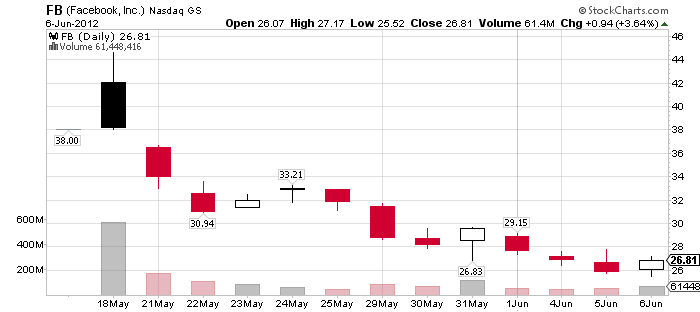
【古風按】臉書(Facebook: FB)自從5月18日開始上市以來,已經從每股38美元的初始上市價格(上市當天最高股價曾達到45美元)下跌到了27美元以下了。如此熱炒的IPO的股價竟然呈現出幾乎直線墜落的狀態基本上是絕無僅有的“黑天鵝”事件,一時間網絡上就傳開了所謂的陰謀論:大的買家通過NASDAQ交易所的技術故障壓低了臉書的股價,好買入盡量多的股份。事實真相是如此嗎?古風不同意這樣的見解。原因何在?如果大的買家真的想積累盡量多的股份,為何在股價直線下跌的過程中,他們不多買進呢?而事實上,除了第一天的交易量超過了5.7億股和第二天的近1.7億股以外,每天成交量幾乎都沒有再高出1億股了。這明顯地說明大買家在IPO後根本就沒有入場買股。恰恰相反,臉書的股價與成交量數據表明自從IPO以來,基本上是賣方市場,臉書的股價一直承受著巨大的賣壓,事實上大賣家在持續賣股。了解了這一點,我們就可以來談論一下“臉書的股價還有多大的下跌空間”的課題了。首先,大家需要牢記一個關鍵的數據:臉書的每股盈利(EPS)隻有39美分,如果按照臉書的IPO起始價(每股38美元),它的市盈率(P/E)有近100倍;如果按照IPO當天的最高價(45美元),其市盈率竟然超過了115倍!即便從最高價已經下跌了40%,現在的市盈率仍然接近70倍。大家如果把臉書的市盈率跟蘋果(AAPL)的14倍和穀歌(GOOG)的17倍做一下對比,就會發現臉書的股價還是太高啦!古風斷言市場最終會把臉書的股價拉回到市盈率14-17倍的區間,這就是說其股價會繼續巨幅下墮,直到每股6美元左右(IPO起始價的15%,最高價的13%,今天收盤價的22%)。當然,古風的預計還算是保守的,如果按照John Azis的推算,臉書最終僅有每股2-4美元(見下附錄英文資料)。因此,古風規勸買入了臉書的網友早點逢高賣出,不要當最後接手雷的那個人啦。
【相關閱讀】古風解讀《股市崩盤五部曲》
http://blog.wenxuecity.com/myblog/46947/201204/204.html
古風解讀美國未來的經濟與股市行情
http://blog.wenxuecity.com/myblog/46947/201203/21036.html
古風解讀摩根大通巨虧20億美元交易的內幕
http://blog.wenxuecity.com/myblog/46947/201205/13383.html
古風再次解讀摩根大通衍生品交易的巨額虧損
http://blog.wenxuecity.com/myblog/46947/201205/24047.html
http://azizonomics.com/2012/05/31/facebook-the-bubble-mentality/
Facebook & the Bubble Mentality
by John Azis, Azizonomics, 31 May 2012
So Facebook keeps falling, and is now floating around the $27 mark. We’re a third of the way down to my IPO valuation of FB as worth roughly $2-4 a share (or 5-10 times earnings), although I wouldn’t be surprised for the market to stabilise at a higher price (at least until the next earnings figures come out and reveal — shock horror — that Facebook is terrible at making money).
The really stunning thing is that even after all these falls, FB is still trading at 86 times earnings. What the hell did Morgan Stanley think they were doing valuing an IPO without any viable profit model at over 100 times earnings? The answer is that this was an exit strategy. This IPO was about the people who got in early passing on a stick of dynamite to a greater fool which incidentally is precisely the same bubble mentality business model as bond investors who are currently buying negative-real-yielding treasuries at 1.6% hoping to pass them onto a greater fool at 0.5% (good luck with that).
This was achieved by convincing investors to ignore actual earnings and instead focus on projected future earnings. From Bloomberg:
Facebook, with a market capitalization of $79.1 billion, is trading at 29.5 times the company’s projected 2014 profit of $2.69 billion, data compiled by Bloomberg show.
Or much more simply, counting chickens before they hatch.
There’s an interesting comparison to the development of AAPL. Steve Jobs — who went on to do great things — was never fully in charge of AAPL until much later on. AAPL externally recruited CEOs with business experience, and Jobs was eventually thrust out of the company he founded, to continue his journey on his own. Failure is a really valuable lesson. Jobs was lucky to experience it and learn from it early before he ever got a chance to destroy AAPL.
FB isn’t really a bad business, and prospects would look much rosier if it were priced more realistically. It’s generating a profit — just a much smaller one than suggested by the IPO pricing. And management are being swept along by everyone else’s irrational euphoria. Zuckerberg can freely throw away a whole year’s earnings buying Instagram — an App whose functionality FB actually duplicated in-house almost certainly for a tiny fraction of the cash thrown at Instagram. And Zuckerberg — who controls a majority of the voting rights — isn’t going to get thrust out into the cold by shareholders. He can keep wildly throwing cash around so long as it keeps flowing into FB. The problem is, given the steep price falls, it looks like the river is running dry.
As I wrote before FB started falling:
The big money coming into Facebook just seems to be money from new investors — they raised eighteen times as much in their flotation yesterday as they did in a whole year of advertising revenue. For an established company with such huge market penetration, they’re veering dangerously close to Bernie Madoff’s business model.
That’s life. Bubbles get burst; the Madoff bubble, the securitisation bubble, the NASDAQ bubble, the housing bubble, the Facebook bubble, the treasury bubble. The trick is not getting swept up by the irrational euphoria. Better to miss a blow-out top than to end up holding a stick of dynamite.
